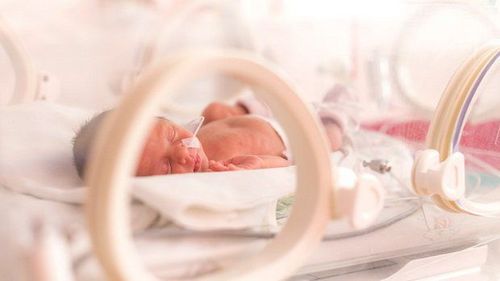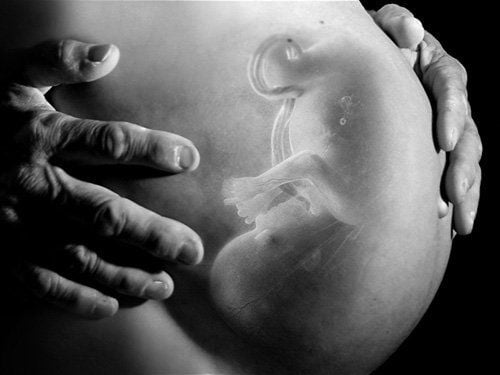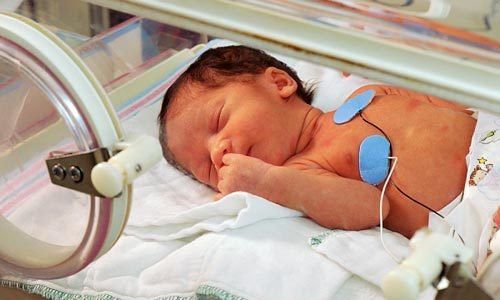This is an automatically translated article.
The article is professionally consulted by Master, Doctor Phan Thi Cam Van - Neonatologist - Department of Pediatrics - Neonatology - Vinmec Danang International General Hospital. He has 07 years of experience as a Resident Doctor and a Pediatrician - Neonatal Doctor at Hue Central Hospital and Hue University Hospital of Medicine and Pharmacy. In particular, he has strengths in newborn care and treatment, neonatal resuscitation, respiratory, digestive and infectious diseases.Acute respiratory distress syndrome is common in premature infants, the shorter the number of weeks of age, the higher the risk. This is a very dangerous syndrome for a child's life, so it should be diagnosed and intervened promptly. So how to recognize acute respiratory failure in infants?
Acute respiratory failure is caused by the lungs not able to guarantee the respiratory function for the baby, respiratory failure can occur right after birth or after a few days, a few hours. Respiratory failure in newborns will result in a lack of oxygen for the needs of the organs, especially the heart and brain, causing CO2 to accumulate, causing respiratory acidosis.
1. Diagnosis of respiratory failure in infants

Chẩn đoán suy hô hấp ở trẻ sơ sinh là điều cần thiết
1.1 History of Prematurity:
The lungs of premature babies lack surfactant, which is necessary for the expansion and contraction of the lungs. This deficiency can lead to shortness of breath and breathing problems. A condition in which a baby's lungs are not fully developed at birth, leading to a lack of surfactant called endothelial disease. An immature nervous system can lead to apnea. The child's resistance is still weak and susceptible to infections (pneumonia). Birth asphyxia: Infants are asphyxiated during birth, causing pulmonary circulation to decrease, making it easy to aspirate.
Caesarean section: Slow absorption of alveolar fluid leads to transient tachypnea.
Mother's water breaks prematurely, antenatal fever, amniotic fluid is cloudy and has a bad smell: newborn babies are susceptible to pneumonia.
Meconium-stained skin: lead to children inhaling meconium.
Mother has diabetes: affects the synthesis of Surfactant, causing endothelial disease.
Children with cold, stress, other diseases: cause increased oxygen consumption.
1.2. Clinical examination The child has rapid breathing >= 60 breaths/minute. Or has apnea of >20 seconds or <20 seconds with a decrease in heart rate <100 beats/min. Chest indrawing Wings of nose rising and breathing Sighs (when exhaling) Central cyanosis Measure and monitor blood oxygen saturation (SaO2), which helps to appoint therapeutic oxygen and use optimal oxygen flow, which is blood flow. The lowest amount of oxygen to achieve a normal Sao2 value is 90-96%. Respiratory failure is SaO2 < 90%. 1.3 Suggest tests The doctor may recommend tests to see if this is due to breathing problems or an infection.
Peripheral blood smear: if sepsis is suspected. Cardiopulmonary x-ray: helps to detect comorbidities or causes of acute respiratory failure such as pneumothorax, pleural effusion, pneumonia, airway foreign body, correct or incorrect intubation position . Arterial blood gases: when respiratory failure fails with oxygen. An echocardiogram may be done to see if the child has any heart problems.
2. Complications of respiratory failure in infants

Suy hô hấp ở trẻ sơ sinh có thể dẫn đến các biến chứng nguy hiểm, thậm chí là tử vong.
Respiratory failure in infants can lead to dangerous complications, which have long-term effects on a child's normal development. In some cases, respiratory failure can also be life-threatening if not treated promptly. In addition, respiratory failure causes some complications such as:
Blindness of the eyes Blood infections Formation of blood clots in the body Children with mental retardation Accumulation of air around the lungs and heart Hemorrhage of the brain or lungs Dysplasia bronchopneumonia Pneumonia Severe respiratory failure can also lead to kidney failure and other organ failure. Depending on the condition of the disease, the complications encountered in each child will be different. Therefore, doctors will have the best treatment methods for the complications that the child is experiencing.
Treatment of acute respiratory failure in infants is considered a major challenge because this condition requires the child to be monitored and cared for continuously with appropriate methods. Currently, the Surfactant pump technique is less invasive and is increasingly being used to treat respiratory failure in neonates.
Surfactant pump technique to treat respiratory failure in newborns has been independently deployed at Vinmec Hai Phong and Nha Trang International Hospitals since April 2019. With a team of experienced doctors who are always dedicated in their work, along with advanced medical equipment, Vinmec is a prestigious choice for you.
As a key area of Vinmec Health system, Pediatrics Department always brings satisfaction to customers and is highly appreciated by industry experts with:
Gathering a team of top doctors and nurses in Pediatrics : consists of leading experts with high professional qualifications (professors, associate professors, doctorates, masters), experienced, worked at major hospitals such as Bach Mai, 108.. Doctors All doctors are well-trained, professional, conscientious and knowledgeable about young psychology. In addition to domestic pediatric specialists, the Department of Pediatrics also has the participation of foreign experts (Japan, Singapore, Australia, USA) who are always pioneers in applying the latest and most effective treatment regimens. . Comprehensive services: In the field of Pediatrics, Vinmec provides a series of continuous medical examination and treatment services from Newborn to Pediatric and Vaccine,... according to international standards to help parents take care of their baby's health from birth to childhood. from birth to adulthood Specialized techniques: Vinmec has successfully deployed many specialized techniques to make the treatment of difficult diseases in Pediatrics more effective: neurosurgery - skull surgery, stem cell transplantation. blood in cancer treatment. Professional care: In addition to understanding children's psychology, Vinmec also pays special attention to the children's play space, helping them to have fun and get used to the hospital's environment, cooperate in treatment, improve the efficiency of medical treatment.
Please dial HOTLINE for more information or register for an appointment HERE. Download MyVinmec app to make appointments faster and to manage your bookings easily.













